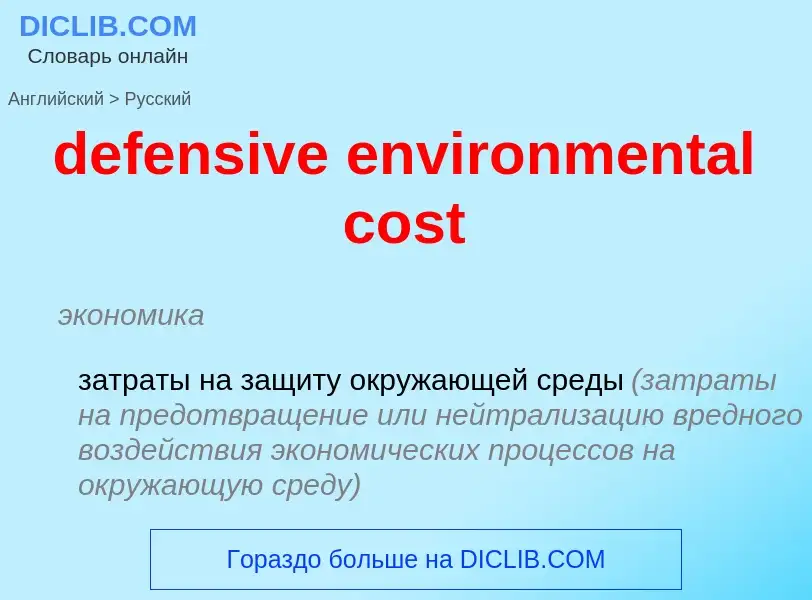Μετάφραση και ανάλυση λέξεων από την τεχνητή νοημοσύνη ChatGPT
Σε αυτήν τη σελίδα μπορείτε να λάβετε μια λεπτομερή ανάλυση μιας λέξης ή μιας φράσης, η οποία δημιουργήθηκε χρησιμοποιώντας το ChatGPT, την καλύτερη τεχνολογία τεχνητής νοημοσύνης μέχρι σήμερα:
- πώς χρησιμοποιείται η λέξη
- συχνότητα χρήσης
- χρησιμοποιείται πιο συχνά στον προφορικό ή γραπτό λόγο
- επιλογές μετάφρασης λέξεων
- παραδείγματα χρήσης (πολλές φράσεις με μετάφραση)
- ετυμολογία
defensive environmental cost - translation to Αγγλικά
экономика
затраты на защиту окружающей среды (затраты на предотвращение или нейтрализацию вредного воздействия экономических процессов на окружающую среду)
Смотрите также
[di'fensiv|'meds(ə)n-{di'fensiv}'meds(i)n]
общая лексика
«перестраховочная медицина» (излишнее число анализов, консилиумов, отказ оперировать тяжёлых больных и т. п.)
Ορισμός
Βικιπαίδεια
Environmental full-cost accounting (EFCA) is a method of cost accounting that traces direct costs and allocates indirect costs by collecting and presenting information about the possible environmental, social and economical costs and benefits or advantages – in short, about the "triple bottom line" – for each proposed alternative. It is also known as true-cost accounting (TCA), but, as definitions for "true" and "full" are inherently subjective, experts consider both terms problematical.
Since costs and advantages are usually considered in terms of environmental, economic and social impacts, full or true cost efforts are collectively called the "triple bottom line". Many standards now exist in this area including Ecological Footprint, eco-labels, and the United Nations International Council for Local Environmental Initiatives approach to triple bottom line using the ecoBudget metric. The International Organization for Standardization (ISO) has several accredited standards useful in FCA or TCA including for greenhouse gases, the ISO 26000 series for corporate social responsibility coming in 2010, and the ISO 19011 standard for audits including all these.
Because of this evolution of terminology in the public sector use especially, the term full-cost accounting is now more commonly used in management accounting, e.g. infrastructure management and finance. Use of the terms FCA or TCA usually indicate relatively conservative extensions of current management practices, and incremental improvements to GAAP to deal with waste output or resource input.
These have the advantage of avoiding the more contentious questions of social cost.

